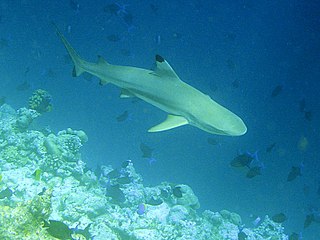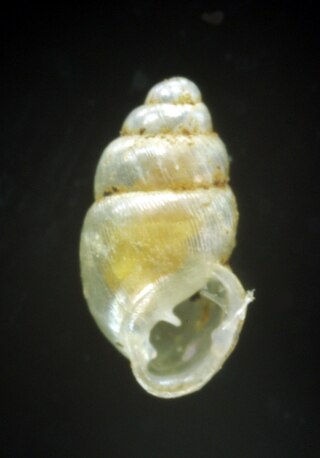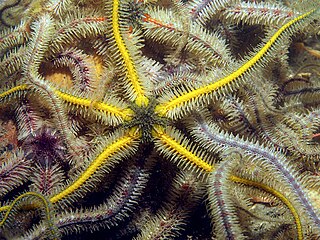
Requiem sharks are sharks of the family Carcharhinidae in the order Carcharhiniformes. They are migratory, live-bearing sharks of warm seas and include such species as the bull shark, lemon shark, spinner shark, blacknose shark, blacktip shark, grey reef shark, blacktip reef shark, silky shark, dusky shark, blue shark, copper shark, oceanic whitetip shark, and whitetip reef shark.

Asterias is a genus of the Asteriidae family of sea stars. It includes several of the best-known species of sea stars, including the (Atlantic) common starfish, Asterias rubens, and the northern Pacific seastar, Asterias amurensis. The genus contains a total of eight species in all. All species have five arms and are native to shallow oceanic areas of cold to temperate parts of the Holarctic. These starfish have planktonic larvae. Asterias amurensis is an invasive species in Australia and can in some years become a pest in the Japanese mariculture industry.

Carpet sharks are sharks classified in the order Orectolobiformes. Sometimes the common name "carpet shark" is used interchangeably with "wobbegong", which is the common name of sharks in the family Orectolobidae. Carpet sharks have five gill slits, two spineless dorsal fins, and a small mouth that does not extend past the eyes. Many species have barbels.

Brittle stars, serpent stars, or ophiuroids are echinoderms in the class Ophiuroidea, closely related to starfish. They crawl across the sea floor using their flexible arms for locomotion. The ophiuroids generally have five long, slender, whip-like arms which may reach up to 60 cm (24 in) in length on the largest specimens.

Orchis purpurea, the lady orchid, is a herbaceous plant belonging to the genus Orchis of the family Orchidaceae.

Vertiginidae, common name the whorl snails, is a family of minute, air-breathing land snails, terrestrial pulmonate gastropod molluscs or micromollusks in the superfamily Pupilloidea.

Carychium is a genus of very small air-breathing land snails, terrestrial pulmonate gastropod mollusks in the family Ellobiidae.

The kraken is a legendary sea monster of enormous size, etymologically akin to a squid or octopus, said to appear in the sea between Norway and Iceland. It is believed the legend of the Kraken may have originated from sightings of giant squid, which may grow to 12–15 m in length.

Juliidae, common name the bivalved gastropods, is a family of minute sea snails, marine gastropod mollusks or micromollusks in the superfamily Oxynooidea, an opisthobranch group.

Euplotes is a genus of ciliates in the subclass Euplotia. Species are widely distributed in marine and freshwater environments, as well as soil and moss. Most members of the genus are free-living, but two species have been recorded as commensal organisms in the digestive tracts of sea urchins.

Marginellinae is a taxonomic subfamily within the larger family of Marginellidae, a group of small sea snails, marine gastropod molluscs in the superfamily Volutoidea.

The scaldfishes comprise a genus, Arnoglossus, of lefteye flounders. They are found in the Pacific, Indian and Atlantic Oceans, including the Mediterranean and Black Sea. They are entirely absent from most of the Americas; the only exceptions are A. coeruleosticta and A. multirastris found off Chile. The genus include both species found in shallow and deeper water. The largest species reaches 28 cm (11 in).

Ophiothrix is a large genus of brittle stars (Ophiuroidea) found in oceans worldwide from tropics to Arctic and Antarctic regions. At present a total of 93 Ophiothrix species have been recognized. It is considered as one of the most interesting genera because of the presence of its brilliant colors and associations with coral and sponges as well. This genus has been labelled particularly difficult with respect to taxonomy, due to a high degree of variability in characters that are described is a morphological aspect.

Myriotrochidae is a family of sea cucumbers.
Ophiacanthidae is a family of brittle stars. Axel Vilhelm Ljungman circumscribed this taxon in 1867; he initially named the subfamily Ophiacanthinae within the family Amphiuridae. Gordon L. J. Paterson promoted its rank to family in 1985.

Ophiomusium is a genus of brittle stars.

Myriotrochus is a genus of sea cucumbers. The following species are recognised in the genus Myriotrochus:

Bathycrinus is a genus of crinoids.

†Zygopleura is an extinct genus of fossil sea snails, marine gastropod molluscs in the family Zygopleuridae.
Ophiojura is a genus of brittle star in its own family, Ophiojuridae. It has only one known species, Ophiojura exbodi, collected by the EXBODI expedition from Banc Durand seamount off New Caledonia in 2011 at a depth of 360–460 m (1,200–1,500 ft). The prefix 'Ophio' comes form the Ancient Greek word for serpent, and 'jura' is derived from the Jura Mountains, which lent its name to the Jurassic period.

















